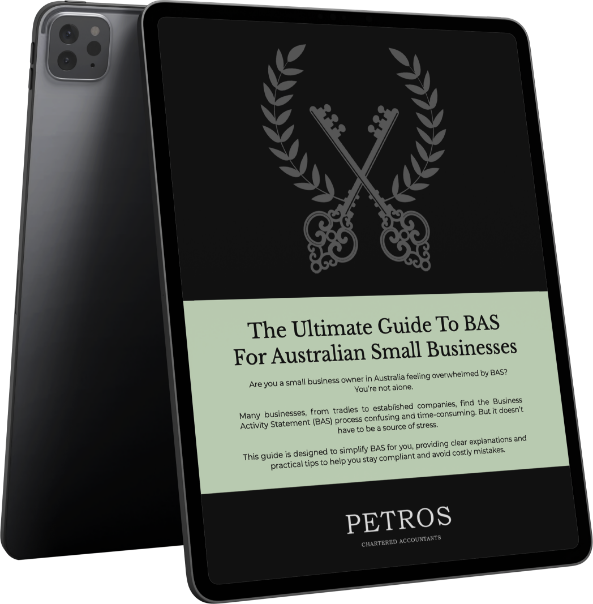Simplify Your ATO Bas Statement – Free Guide To Streamline Reporting
Managing your ATO BAS statement can be complex and time-consuming. Without proper understanding, errors in GST reporting, PAYG instalments, and other obligations can lead to compliance issues and financial stress.

What’s Included in the ATO BAS Statement Guide for Australian Small Businesses?
This free guide provides practical, step-by-step strategies to help you navigate the complexities of the ATO BAS statement, ensure compliance, and avoid costly mistakes.
Inside, you’ll find:
- Understanding BAS Requirements
- Step-by-Step Guide to GST Reporting
- PAYG Withholding & Instalments Explained
- Managing Other Taxes in BAS
- Common BAS Mistakes and How to Avoid Them
- How to Lodge Your BAS
- Tips for Accurate BAS Reporting
- Next Steps to Ensure BAS Compliance

Who Is This Guide For?
This guide is designed for Australian business owners aiming to simplify their Business Activity Statement (BAS) reporting, ensure compliance, and avoid costly errors. Whether you’re new to BAS or seeking to streamline your current processes, the strategies within will help you manage your tax obligations effectively and focus on growing your business.
This guide is for you if:
- You’re a small business owner registered for GST and need clear guidance on preparing and lodging your BAS.
- You find BAS reporting complex or time-consuming and seek simplified, actionable steps to ease the process.
- You’re unsure about your BAS obligations and want to ensure compliance with ATO requirements.
- You prefer to handle BAS internally but need structured guidance to do so accurately.
- You want to minimise the risk of ATO fines and penalties by understanding and avoiding common BAS mistakes.
How You Benefit From Streamlined BAS Reporting
Save Time & Reduce Stress
Automate routine financial tasks to minimise manual effort, allowing you to focus more on running your business and less on managing spreadsheets.
Improve Cash Flow Management
Maintain a clear view of your cash flow by accurately tracking expenses and forecasting revenue, helping you meet financial obligations and seize growth opportunities.
Stay Tax & Compliance Ready
Organise your financial records year-round to ensure you’re prepared for tax season, minimising tax liabilities and avoiding last-minute filing stress, while staying compliant with Australian tax laws.
What Our Clients Say
FAQs
Still have some questions?
Let us know how we can help you.
An ATO BAS (Business Activity Statement) is a tax reporting document that Australian businesses submit to the Australian Taxation Office (ATO). It reports various tax obligations, including Goods and Services Tax (GST), Pay As You Go (PAYG) withholding, PAYG instalments, and other taxes. For a comprehensive understanding, refer to our guide, “The Ultimate Guide to ATO BAS Statements for Australian Small Businesses.”
Businesses registered for GST are required to lodge a BAS. This includes businesses with an annual turnover of $75,000 or more, or $150,000 for non-profit organisations. Additionally, businesses with employees who withhold tax from wages must also lodge a BAS. Our guide provides detailed information on BAS requirements tailored for small businesses.
To prepare your BAS, you’ll need records of all income and sales transactions, tax invoices, receipts, and records of cash and digital sales. If registered for GST, include all tax invoices from suppliers to claim GST credits. Detailed record-keeping is essential, as outlined in our guide.
The frequency of BAS lodgement depends on your business’s GST turnover and reporting preferences. Businesses with a turnover less than $20 million typically lodge quarterly, while those with higher turnovers may be required to lodge monthly. Our guide discusses BAS lodgement periods and deadlines to help you determine your reporting schedule.
Due dates vary based on your reporting frequency. Quarterly BAS are generally due on the 28th day of the month following the end of the quarter, while monthly BAS are due on the 21st day of the following month. It’s crucial to adhere to these deadlines to avoid penalties. Our guide provides a detailed schedule to help you stay compliant.
Yes, BAS can be lodged online through the ATO’s Online Services for Business portal, via your myGov account (if you’re a sole trader), or through a registered tax or BAS agent. Our guide offers step-by-step instructions on how to lodge your BAS electronically.
If you realise an error after lodging your BAS, you can correct it by lodging an amended BAS. It’s important to address mistakes promptly to ensure your tax records are accurate. Our guide explains the process of fixing BAS mistakes and making adjustments.
Yes, failing to lodge your BAS on time can result in penalties, including fines and interest charges. The ATO monitors lodgement compliance closely. Our guide emphasises the importance of timely BAS submission to avoid such penalties.
If your business is registered for GST, you can claim GST credits for GST included in the price of goods and services you purchase for your business. This helps offset the GST you collect on sales. Our guide provides detailed information on calculating and reporting GST credits.
Deciding between DIY BAS preparation or hiring a professional depends on your familiarity with tax regulations and the complexity of your business’s financial activities. Our guide discusses the pros and cons of both approaches to help you make an informed decision.
Master BAS Reporting Today!
Our guide offers expert-backed strategies to streamline your BAS reporting,
improve financial stability, and free up your time.
Blogs

Tax Agent BAS Due Dates: What Business Owners Need To Know
Staying on top of BAS due dates is a regular part of running a business registered for GST. Whether you lodge monthly or quarterly, missing a deadline can lead to

